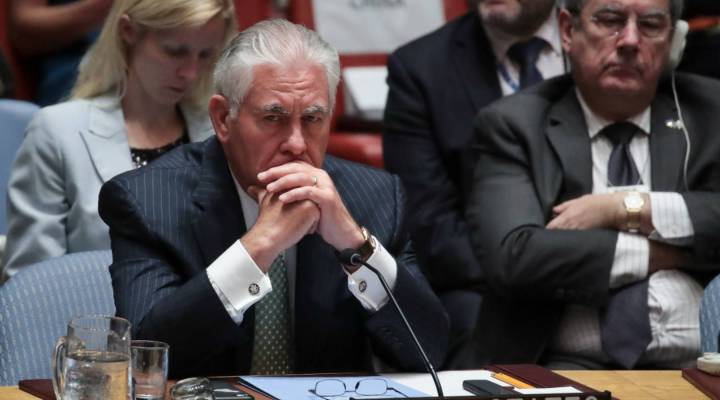
The diplomatic approach to North Korea is a long game

The exchanges between President Donald Trump and North Korean leader Kim Jong Un have been less than diplomatic. But beneath all the Twitter noise, progress — albeit small steps — is being made in isolating Pyongyang.
Felicia Schwartz, who reports on the U.S. State Department for the Wall Street Journal, wrote about the U.S. diplomatic efforts to pressure North Korea. Marketplace host Kai Ryssdal spoke with Schwartz about her reporting. The following is an edited transcript of their conversation.
Kai Ryssdal: Lots of sound and fury, as I said, in public between the two leaders. More quietly, though, and for a year plus now, there’s been some things happening behind the scenes. What exactly is diplomacy doing with North Korea?
Felicia Schwartz: So diplomats at the State Department have been quietly working to press countries all over the world to, one, downgrade diplomatic presences wherever North Korea has them. And two, to try to cut down on economic ties and guest workers, which is kind of one in the same. So that effort actually started during the Obama administration, but the Trump administration has certainly elevated and kind of put a lot of focus on that effort.
Ryssdal: Give me some examples. What kinds of things are happening out there in the world to sort of put the squeeze on North Korea?
Schwartz: So a lot of this is kind of unglamorous, unsexy, stuff. For example, one problem that officials have tried to contend with is that North Korean vessels will often fly a flag of a country that is not North Korea because they cannot, you know, travel very easily under U.N. sanctions. And so Fiji, for example, you know, a very senior U.S. diplomat recently called on Fiji in a meeting to crack down. They flagged as many as 10 North Korean vessels that are flying Fiji flag.
Ryssdal: All of these businesses and ships and all of this stuff that the North Koreans run, it’s all about getting them hard currency, right? Either dollars or euros or whatever it is that they can then use.
Schwartz: Yeah, especially the embassies are a big source of, basically, cash for North Korea. They are self-sufficient. Diplomats can set up bank accounts in the countries that they are working in because they need those accounts to function. And, again, a lot of this is sort of tiny, like flagging accounts here and there. But for North Korea, whose GDP is quite small, anyway, like all of this stuff adds up.
Ryssdal: OK. But here’s the follow up: on the theory that countries are not always eager to be seen working with the United States — right, so that’s that’s one challenge here — but then the other one is, you’ve got the president and Kim Jong Un yelling and screaming at each other on Twitter. Does that make this kind of diplomacy more difficult?
Schwartz: I don’t think it helps, especially in the higher-level asks, and I think there’s a lot of uncertainty, especially recently about, you know, does the secretary speak for the president? On the flip side, I’d also say that this campaign predates the Trump administration. A lot of it is sort of lower-level, mechanical. There is a bunch of it happening at the working level, because many of the asks are quite small, so I guess it’s just hard to measure how that will impact this campaign.
| 4 things you didn’t know about North Korea’s economy |
| Why blocking trade with China isn’t the answer to North Korea |
There’s a lot happening in the world. Through it all, Marketplace is here for you.
You rely on Marketplace to break down the world’s events and tell you how it affects you in a fact-based, approachable way. We rely on your financial support to keep making that possible.
Your donation today powers the independent journalism that you rely on. For just $5/month, you can help sustain Marketplace so we can keep reporting on the things that matter to you.












